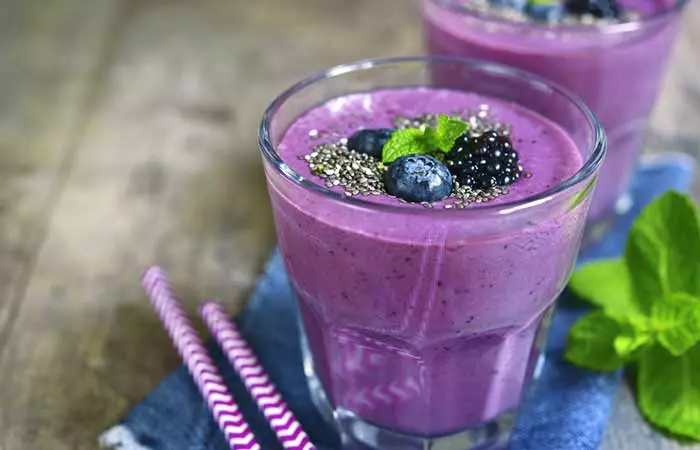Blueberries may also help lower blood pressure, reduce cancer risk, and improve cardiovascular health. There are several other reasons to include blueberries in your diet. This article explores the rich nutrient profile of blueberries, their health benefits, and potential risks. Read on to learn more.
11 Science-Backed Benefits Of Blueberries
1. High In Antioxidants
Blueberries are high in antioxidants that prevent or delay cell damage. They contain plant chemicals like polyphenols and flavonoids, which may help prevent chronic diseases (1). A study conducted by Cornell University (USA) found that blueberries have high cellular antioxidant activity (CAA). Thus, consuming them may decrease oxidative stress (2). They also contain flavonoids like anthocyanins (a plant compound) that may help improve the vascular system and brain function (3), (4). Another study suggests that increased intake of antioxidant-rich foods may reduce the risk of chronic degenerative diseases (5). Pterostilbene, another antioxidant component found in blueberries, may prevent inflammation and improve diabetes (6).
2. May Help Reduce The Risk Of Cancer
The rich antioxidant profile of blueberries may help prevent carcinogenesis and cancer cell growth (7). They contain phytochemical compounds that protect the cells from chronic inflammation (8). However, sufficient human-based data is not available to prove this benefit of phytochemicals from fruits. Consuming blueberries may also help reduce DNA damage (9). A study found that drinking blueberry juice for four weeks had a protective effect on oxidative DNA damage – a major cause of cancer (10). However, more studies need to be conducted in this area.
3. May Improve Cardiovascular Health
Research suggests that increased intake of anthocyanin-rich foods may help reduce the risk of heart attack in young women. People who ate blueberries thrice or more a week posed a lower risk in this regard (11). Consuming a cup of blueberries a day may also reduce the risk of cardiovascular diseases and improve heart function (12). A study showed that eating wild blueberries for a month improves the vascular system (13). Another study conducted by the University of Arkansas (US)also found that blueberry intake may prevent cardiovascular diseases (14). However, more studies are required to prove this claim.
4. May Lower Blood Pressure
Consumption of blueberries can lower blood pressure effectively (13). A study suggests that daily blueberry intake may help reduce blood pressure and arterial stiffness (15). The minerals like calcium, potassium, and magnesium found in blueberries may also help reduce blood pressure (16). Moreover, daily intake of blueberry powder for six weeks was found to reduce diastolic pressure (blood pressure in arteries) (17).
5. May Improve Cognitive Performance
Supplementation of blueberry may improve memory in older people (18). It may also prevent incidences of cognitive decline and reduce depression symptoms. A study conducted by the Brigham and Women’s Hospital (US) found that the high flavonoid content of blueberries may slow down the cognitive decline rate (19). Berry fruits also have neuroprotective effects that help improve age-related neurodegenerative diseases and cognitive functions (20). Blueberry supplementation may also improve short-term memory conditions (21).
6. May Help Manage Diabetes
Blueberries are rich in bioactive compounds such as polyphenols. Including these compounds in your diet may lower the risk of type-2 diabetes (22). The low glycemic index (meaning, they digest slowly) of blueberries is less likely to cause spikes in blood sugar (23). Moreover, a six-week dietary supplementation of freeze-dried whole blueberry powder was found to improve insulin sensitivity in obese and non-diabetic individuals (24). Extracts of Canadian lowbush blueberries were also found to have anti-diabetic potential (25).
7. May Strengthen Bones
The vitamins and minerals in blueberries may help maintain bone health. They prevent the loss of collagen in the bone matrix (26). A review published in the Journal of the International Society of Sports Nutrition suggests that consuming blueberries may help in recovery from exercise-induced muscle damage (EIMD) (27). However, more studies are required to understand the benefit of blueberries in humans.
8. May Fight Urinary Tract Infections
The antibacterial effect of blueberries may help treat or prevent urinary tract infections (28). A study conducted by the University of Stirling (UK) found that drinking blueberry or cranberry juice may prevent symptomatic urinary tract infections (UTIs) (29). However, limited data is available in this regard.
9. May Improve Kidney Function
Adequate consumption of blueberries may have a positive effect on overall kidney function. A study done on animals with metabolic syndrome conditions has shown that the antioxidants from blueberries reduce oxidative stress and protect the kidney against inflammation-induced structural injury and the risk of dysfunction (30). Another study hypothesizes that berries such as blueberries, raspberries, strawberries, and cranberries are rich in polyphenols, which can potentially lower uremic toxin levels in the body through modulation of gut microbes (31). This may protect or help treat renal issues in patients with chronic kidney diseases in the long term. However, further research is required for more conclusive results.
10. May Boost Immune System
Blueberries are high in vitamin C, which strengthens the immune system and supports collagen production, a protein that keeps the skin firm and supple. Collagen is especially important for people who spend a lot of time in the sun as UV rays may break down collagen.
11. May Improve Digestion
Blueberries contain fiber, which helps to maintain the digestive system. Fiber is a type of carbohydrate that is not digested by humans. Instead, it passes through the body without being absorbed into the bloodstream. Blueberries are considered to be a wonder fruit due to their impressive nutritional profile. In the next section, we discuss the nutritional breakdown of blueberries.
Blueberry Nutrition Facts
According to the U.S. Department of Agriculture, 100g of blueberries (raw) contains (32):
Calories: 57 Protein: 0.74g Fat: 0.33g Fiber: 2.4g Sugars: 9.96g Calcium: 6 mg Iron: 0.28 mg Magnesium: 6 mg Phosphorus: 77 mg Sodium: 1 mg Vitamin C: 9.7 mg Thiamin: 0.037 mg Pantothenic acid: 0.124 mg Folate: 6 µg
Blueberries are rich in not only vitamins and minerals but also phenolic compounds. But, how do you include blueberries in your diet? Scroll down to find out!
How To Include Blueberries In Your Diet
Add blueberries to fruit salads. Add them to oatmeal or cereal. Toss them into pancake batter or on top of waffles. Incorporate them into homemade ice cream. Make yogurt with them. Freeze them with some water in ice cube trays. Use the ice cubes to make infused water. (Make sure to pop the berries in your mouth after drinking the water!) Make blueberry jam. Prepare salsa with them to use as a topping for meats.
Follow these tips to add blueberries to your diet. But, what about blueberry recipes? In the next section, we bring you three easy and delicious blueberry recipes to try at home. Blueberry Recipes To Try Out
1. Blueberry Chia Smoothie
What You Need
Blueberries – ½ cup Frozen banana – 1 Coconut water – ¼ cup Peanut butter – 1 tablespoon Chia seeds – 1 tablespoon Vanilla protein powder – 1 scoop Kefir – ½ cup
Process
2. Blueberry Muffins
What You Need
Blueberry – 100g Eggs – 2 Honey – 4 tablespoons Low-fat yogurt – 150 ml Rapeseed oil – 50 ml Wholemeal flour – 200g Apple sauce or pureed apple – 100g Mashed ripe banana – 1 Rolled oats – 50g Baking powder – 11/2 teaspoon Cinnamon – 11/2 teaspoon Bicarbonate of soda – 11/2 teaspoon Mixed seeds – 2 tablespoons
Process
3. Blueberry Almond Bread
What You Need
Fresh blueberries – 1 cup Flour – 2 cups Baking powder – 11/2 teaspoon Granulated sugar – 1 cup Melted butter – 1 stick Large eggs – 2 Vanilla extract – 1 teaspoon Almond extract – 1 teaspoon Plain Greek yogurt – 1 cup Sliced almonds – ¼ cup
Process Celeste, a blogger, details her experience picking blueberry and how she used it to make yummy food. She wrote, “This mouth-watering blueberry jam is one way I put those berries to good use. The rest are either snuggled away in the freezer, or have been turned into other desserts (i).” Given their long list of health benefits, incorporating blueberries in your diet is a good idea. But, are there any side effects of eating blueberries? Keep scrolling to know more.
Risks Associated With Eating Blueberries
Consuming blueberries is generally considered safe. However, they may cause an allergic reaction in some people (33). People who are on blood-thinners like Warfarin should avoid eating blueberries as they contain vitamin K. However, limited data is available on the side effects of blueberries.
The Bottom Line
What happens if I eat blueberries every day? Blueberries, in moderation, can help boost brain, heart, and bone health. How many blueberries should I eat in a day? Dietary Guidelines for Americans, 2020-2025, suggest that you can eat up to 2 cups of blueberries a day (34). Do blueberries help you sleep? Anecdotal evidence suggests that the antioxidants and tryptophan in blueberries may help you sleep better. However, scientific studies are lacking to confirm this claim. Watch the following video to uncover the hidden benefits of blueberries to learn how these berries can be more than just a tasty snack. The video explores their surprising health advantages which make them a superfood.
Personal Experience: Source
(i) Easy Lemon Blueberry Jam + An Itchy Berry-Picking Experience https://sugarandspice-celeste.blogspot.com/2013/07/easy-lemon-blueberry-jam-itchy-berry.html








